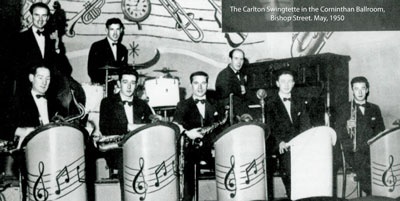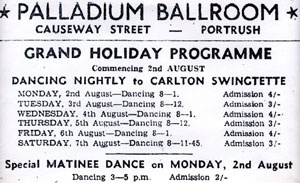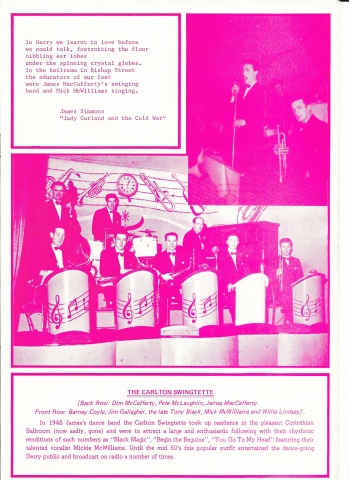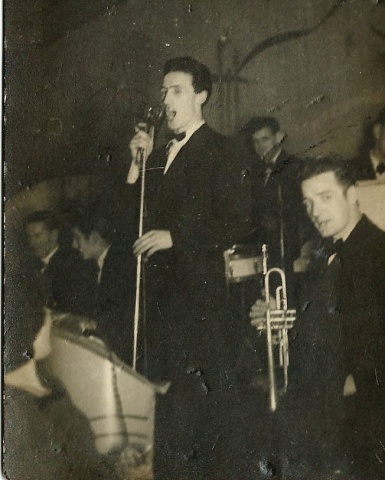In 1936 James heard that Bobby Beattie was looking for a sight-reading pianist for his dance band. He auditioned for the job and for almost twenty years he was involved with dance bands of one kind or another . One particular occasion stuck out in James’s memory. “When I started originally the long dances lasted from nine till five in the morning. But I remember playing in - of all places - the B Specials’ hut out at Molenan. And the dance started at eight. At twelve o’clock you came off for a cup of tea and a bag of buns. Now if you were anyway lucky, you got a nice bag of buns. I remember that night I got poor ones. The last dance was called at ten to eight. We had played twelve hours, except for half an hour. Fifteen shillings. I remember coming into Derry and meeting the factory girls. At that time they were moving in at half-eight.”
Dance band musicians have traditionally enjoyed a colourful reputation and while drink, drugs and womanising were not uncommon, they were no more so than in many walks of life and, by and large, most of the lads were really only interested in playing music and making a living. As it happened Beattie’s band, The Orpheus, wasn’t one of the better musical outfits, and James reckoned that the only other worthwhile player in the outfit was Tony Black.
James gave a flavour of the time. “These bands - they didn’t play the parts. The Carlton Swingtette were among the first to play parts. You ordered them from across in England, or you tried to arrange a couple yourself. But in the old days you got a piano sheet and everybody thumped away at the melody or tried to harmonise as well as they could. It wasn’t very satisfactory.“
By the time that World War Two began and the city filled up with armed forces James was leading his own outfits. “ During the war there a Lt. Colonel Mc Allister who would have been a cousin of the Queen Mother’s and he took a kind of a shine to me. His job was to entertain when the boats came in. It was up to him to put on an entertainment of some kind. So he just used to send for me and say “James there’ll be five or six boats tomorrow night. Put on something.” That was in The Apprentice Boys’ Hall.”
Of course there were dozens of dance halls then and plenty of work for all the musicians in the town. The Palais de Dance was where James’s original Carlton line-up took up residence after the war . Besides Don, Mc Cafferty there were Tony Black, Barney Coyle, Stan Feeney, Harry Bridge with Tommy Laird or Bertie Barret taking the vocals.
While he was the most modest of men, he took enormous pride in his chosen career as a professional musician and could never really comprehend why some of his fellow bandsmen refused to wear their bow ties on the way to work, or closed their coats and turned up their collars to hide their dinner jackets. James invested his chosen profession with huge dignity.
Entirely at home in the world of swing and jazz, by 1948 James’s band, The Carlton Swingtette, were packing the crowds in at The Palladium in Portrush. There had been some changes in the outfit and the band now contained some of the best talent around. Joining Don, Tony and Barney there were Peter Mc Laughlin on drums, Jim Gallagher on reeds and Willie Lindsay on trumpet. The vocalist was Mick Mc Williams.
When a vacancy came up in The Corinthian Ballroom in Bishop Street The Carlton took up residence in what was one of the top dance halls in the country. They proved to be just as popular with the home crowd who flocked to hear Mc Williams’ renditions of all the hits of the time. As James observed, “Then Mickey came along and everybody took a back seat. He was the Frank Sinatra of this part of the world. Mickey was a great singer.” It was an opinion shared by the poet, James Simmons :
In Derry we learnt to love before
We could talk, foxtrotting the floor,
Nibbling ear lobes
Under the spinning crystal globes.
In the ballroom in Bishop Street
The educators of our feet
Were James MacCafferty’s swinging
Band and Mick McWilliams singing.
On their free nights they were frequently in demand for broadcasts with the B.B.C. and appearances at festivals.
In a Radio Foyle tribute to Mick Mc Williams there was a man who led several outfits of his own, perhaps most notably The Woodchoppers, who recalled an instance which at once illustrated how well rehearsed the Carlton were and how routine the job had become for James.
Like so many dance goers and musicians Willie Bradley was a regular visitor to the Corinthian to hear the band.
“Standing at the edge of the stage you couldn’t help but notice certain things. I was used to seeing James at the piano but going closer I discovered that while he was playing he was reading the football results in “The Saturday Night.” I would say that band could play every number without looking at the sheet music.”




